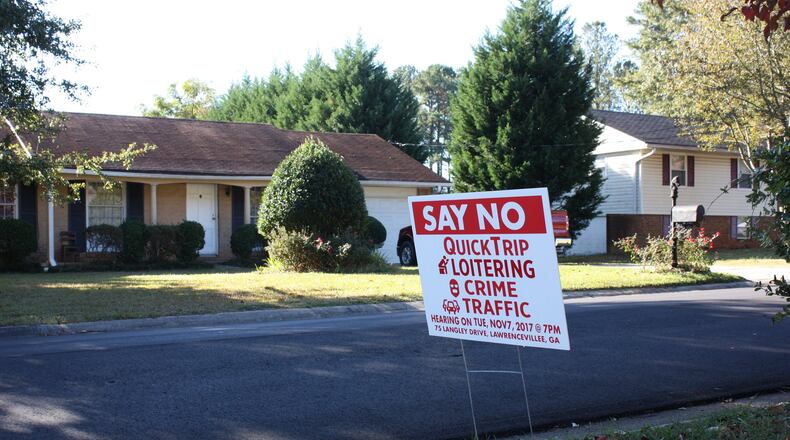In a zoning hearing last week, Gwinnett County Commission Chairwoman Charlotte Nash asked if anyone wished to speak in opposition to a new QuikTrip convenience store proposed for an intersection on Jimmy Carter Boulevard.
Most of the people in the room, many wearing black T-shirts reading “Save Our Neighborhood,” rose in unison.
“Uh,” Nash said. “You are going to have to divide your time up.”
The residents beat back the plans of QuikTrip to build a massive gas station at their doorstep. That fight may not be over, but it was a giant victory for a working class neighborhood against a multi-billion corporation.
Almost at the same time, an industry-led attempt to regulate — and spread — booting of vehicles on private property died after lawyers and the aggrieved motorists they represent pushed back on the practice. Now the Atlanta City Council is looking into forbidding in the practice entirely, joining Cobb, Gwinnett and Clayton counties, among others, who have done so.
AJC Watchdog, the column I write, played a role in these victories. I wrote columns on these community issues that began as tips from readers.
But the trophies go to the activists and citizens who fought against long odds.
Let’s start with 84-year-old Billie Elliot, who had been faced with the possibility of 6,000-square-foot, 24-hour gas station mere feet from her bedroom window. When she spoke to the commissioners it looked liked something from a Frank Capra movie.
“I raised my four children here in this house and I have wonderful memories to keep in my heart forever,” she said. “Please do not sacrifice my quality of life for a gas station. I’ve lived too long to have it end like this – in the backyard of a massive gas station.”
Elliot asked her elected representatives to hear her. They did, voting unanimously against QuikTrip’s rezoning request.
I've got nothing against QT. Like most Atlantans, I have a dozen of them within three miles of my front door, stretching in all directions. These people just didn't want one clogging the entrance into their already traffic-choked but otherwise quiet, blue-collar community.
Most of that land is zoned commercial and QuikTrip could scrunch its plans and build there anyway without rezoning adjacent parcels. A good corporate citizen might just fold its tent and not go where it clearly isn’t wanted. We’ll see. The fight may not yet be over.
Grassroots pressure crimps booting
In the Legislature, House Bill 774 sought to define the immobilization of cars with a tire boot as a legal, regulated way to police parking on private property. The bill was pushed by a coalition of booting companies who are facing a growing tide of local ordinances banning the practice and lawsuits challenging its legality.
HB 774 was sponsored by the chairman of the House Homeland Security and Public Safety Committee and appeared stamped for easy passage. But a couple of passionate lawyers whose clients claim they were unfairly and illegally booted in metro Atlanta parking lots virtually filibustered the bill in committee hearings.
The bill that emerged actually represented the pure democratic process of give and take, with supporters and opponents compromising and working out agreed-to language. The booting companies completely withdrew their support, in part because it required communities to opt in to booting as a practice rather than casting it statewide by legislative decree.
In Atlanta, community response to widespread booting has been so negative, the Atlanta City Council is considering banning the practice altogether. An ordinance outlawing booting on private property passed out of the council's Public Safety Committee with broad support, but push back from booting companies has slowed it down.
The draft ordinance states booting “negatively impacts businesses and tourism” by fostering confusion among drivers about where to park. This confusion ties up police and other city resources as irate drivers argue with booting company employees whose only concern is getting $75 from them to take the boot off.
This is a grassroots issue for metro residents who feel booting is predatory and unfair. I know because I hear from you regularly and it’s your feedback that has caught the attention of local politicians.
It may seem like government officials are deaf to your concerns or too deep in the pockets of special interests, but in reality they often are just waiting to hear from you. These two examples prove that, even in a small way.
About the Author
Keep Reading
The Latest
Featured





